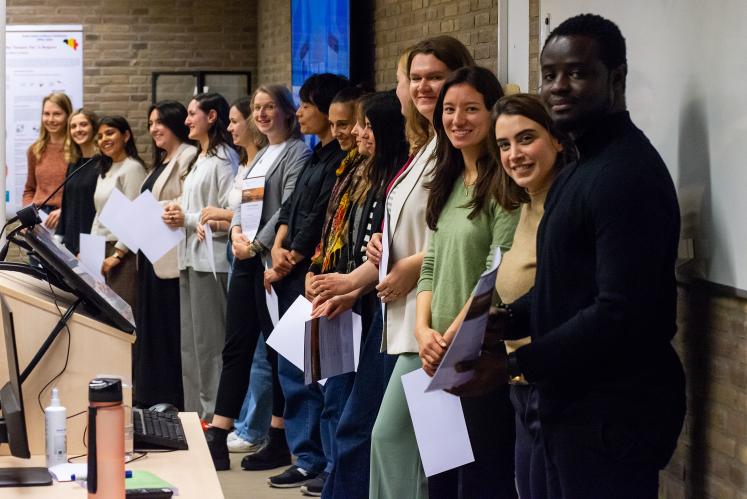This summer, UNU-MERIT is once again contributing to the Maastricht Summer School, with a rich lineup of policy-oriented courses that combine academic rigour, hands-on application, and interdisciplinary learning. From evaluating policy impact and managing knowledge to ensuring justice and intercultural fluency, these courses offer participants the skills and tools to navigate today’s complex global challenges.
Seven UNU-MERIT researchers are delivering summer school offerings this year. Below, they reflect on their courses and the value they bring to students preparing to lead in public policy, international organisations, research, and beyond.
Demystifying the Public Policy Process
Diana Owuor & Mindel van de Laar – Public Policy Process
“Public policy is an often-misunderstood concept. What constitutes policy and how does that differ from lawmaking? This course allows you to break down the policy process into its different stages, understanding the actors involved, motivations and challenges across the policy domain.
We also investigate recent trends in policy formation and how the structure of the world today affects the process, including the upsurge of public interest through the mediation of technology and other mediums of communication. We begin with agenda setting—what constitutes a public agenda—continuing to policy formulation, adoption and implementation, with evaluation at the tail end. Naturally, it is an iterative process with possible swings between the different stages.
We investigate contentious issues such as the revolving door phenomenon, pork barrel politics, among others. The course is designed to empower policy practitioners and non-practitioners by doing a deep dive into what comprises the policy process and how to engage in it. Our students have gone on to work at key policy institutions including the European Union, national governments and research institutes.”
Mindel van de Laar – Writing a Policy Brief Based on Your Thesis Research
“The time that people allow themselves to read reports or articles is minimal these days. This holds true for the general population, but also for working professionals and policymakers. This contrasts with research outputs still requested at the end of bachelor or master programmes—such as theses—which aim to be methodologically sound and detailed, but are often too dense for quick communication.
Translating long academic articles into shorter, accessible formats is not straightforward. While students don’t typically advise policymakers early in their careers, the skill of summarising complex work into clear policy briefs is valuable across sectors. As employers increasingly prioritize creativity and communication—especially with AI automating repetitive tasks—this soft skill becomes essential for career growth.
This course supports participants in using existing research to craft short, easy-to-understand policy briefs. We introduce a practical toolkit with instructional materials, brief templates, and good/poor practice examples. Students work step-by-step to translate their thesis into a brief, identify target audiences, and design dissemination strategies. With peer learning and feedback throughout, participants leave the course with a final brief suitable for sharing with employers, LinkedIn, or public repositories.”
Evidence in Action
Diana Owuor & Mindel van de Laar – Public Policy Analysis
“Evidence-based decision-making begins with an understanding of what constitutes valid evidence. Policies are rarely agreed upon universally; therefore, it is important to be able to prove their impact, both positive and negative.
This course takes as its central focus the process of monitoring and evaluation. By investigating this process, we seek to utilize tools and methods such as randomized control trials to equip students with the capacity to understand which tools are appropriate in which contexts, and what shortfalls they can anticipate in their application of the different tools—while also learning how to overcome them.
We also investigate the different motivations of stakeholders and how their interests play a role in policy analysis. Given the variety of data available—from administrative data to census data—we engage students in an investigative process to ideate on what data is applicable for different scenarios. In the end, the goal is not only to understand how to undertake an evaluative process, but also be able to interrogate which process is most effective for a specific case and why.”
Managing Knowledge in a Complex World
Lutz Krebs – Knowledge Management for Young Professionals
“We are knowledge workers—our success depends on having actionable knowledge. We compete not just with others, but also with large language models that cost a fraction of a salary and work 24/7. Our competitive advantage is expertise and quality.
That's not an easy feat: it's easy to become overloaded with the amount of information available. This affects early-career professionals more: they don't yet have decades of expertise, and they often have to learn and process more in their early career.
Knowledge management allows you to bank information that is 'known good': material you have collected and reviewed; notes you have gathered; output you have produced. It works like a 'storage expansion' for your mind, helping you collect information once while retaining future access. The real magic lies in making your knowledge accessible: easily findable and presented to facilitate discovering connections.
This course is designed to help you build your personal knowledge vault, hands-on using your material. We'll design your vault to work to suit your needs, feed it with material you already have, and build habits to keep filling and using it. You'll have a working knowledge-management system that fits you by the end of our week together.”
Justice as a Foundation for All Rights
Julieta Marotta – Access to Justice for Vulnerable Groups
“Access to justice is more than a legal principle—it’s the gateway to claiming and protecting all other rights. Yet, people around the world continue to face systemic barriers to justice, especially vulnerable groups such as women, children, and migrants. These obstacles range from limited legal awareness and financial hardship to discriminatory procedures and complex legal systems.
While international and national laws have made significant progress in addressing these challenges, particularly through the human rights conventions and their incorporation in the global framework of SDG 16, critical gaps remain. This interactive short course at UNU-MERIT offers students the tools to examine both the legal and policy progress made and the inequalities that persist.
Participants will explore how access to justice is defined, measured, and implemented through the lens of law, society, and policy. The course blends legal theory with empirical evidence and participatory research methods to help students understand the lived experiences of those excluded from justice systems.
Through dynamic lectures, debates, and hands-on group work, students will analyse real-world case studies and design their own research project to tackle pressing justice issues in their own communities.
Join us to better understand justice—and be part of the change.”
Communicating Across Cultures
Ortrun Merkle – Bridging Cultures: Intercultural Skills for Global Success
“Intercultural competence is essential for effective communication in global settings. It ensures that individuals can recognize how values, norms, and communication styles differ across cultures—and to adapt accordingly in their own conversations. Without these skills, even well-intentioned collaboration can lead to misunderstandings or conflict.
Our summer school course equips students with both theoretical insights and practical tools to navigate cultural complexity. Participants learn to apply key frameworks such as Hofstede’s dimensions and high-/low-context communication to real-world situations. Through interactive methods—role plays, case studies, and group activities—they practice adaptive communication, conflict resolution, and perspective-taking.
What makes the course stand out is its strong focus on experiential learning. Rather than passively absorbing theory, students actively engage with cultural dilemmas and ambiguous scenarios drawn from real-life contexts. These hands-on exercises not only challenge assumptions but also build the confidence and agility needed to collaborate across difference.
The result is a dynamic, immersive learning environment that prepares participants for success in intercultural settings at university, work, or in their private life.”
Together, these summer school offerings illustrate UNU-MERIT’s commitment to equipping the next generation of changemakers with evidence-based tools, critical skills, and real-world applications. Whether in public policy, justice, communication, or knowledge work, our faculty are helping students understand today’s policy landscape—and prepare to shape tomorrow’s.
Suggested citation: Dr. Diego Salama. "Training Tomorrow’s Policymakers: UNU-MERIT in the 2025 Maastricht Summer School ," United Nations University, UNU-MERIT, 2025-05-26, https://unu.edu/merit/article/training-tomorrows-policymakers-unu-merit-2025-maastricht-summer-school.



